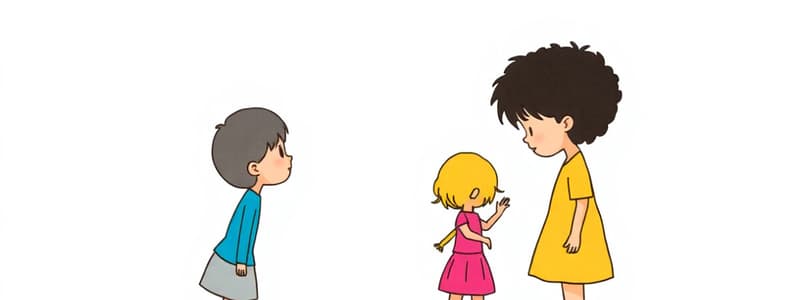Podcast
Questions and Answers
At what developmental stage do children first begin to understand the concept of conservation?
At what developmental stage do children first begin to understand the concept of conservation?
- Sensorimotor Stage
- Formal Operational Stage
- Concrete Operational Stage (correct)
- Preoperational Stage
What cognitive ability allows children in the Concrete Operational Stage to understand that addition and subtraction are reversible operations?
What cognitive ability allows children in the Concrete Operational Stage to understand that addition and subtraction are reversible operations?
- Abstract thinking
- Classification
- Reversibility (correct)
- Conservation
Which example best illustrates a characteristic of the Formal Operational Stage?
Which example best illustrates a characteristic of the Formal Operational Stage?
- Debating complex moral dilemmas (correct)
- Arranging objects by size and shape
- Solving puzzles with physical objects
- Understanding that the amount of liquid remains constant despite shape changes
Which statement best defines conservation in the context of cognitive development?
Which statement best defines conservation in the context of cognitive development?
What is a distinguishing feature of the Concrete Operational Stage compared to the Formal Operational Stage?
What is a distinguishing feature of the Concrete Operational Stage compared to the Formal Operational Stage?
What is the primary crisis faced by infants in Erikson's first stage?
What is the primary crisis faced by infants in Erikson's first stage?
At which stage do children develop a sense of competence according to Erikson's theory?
At which stage do children develop a sense of competence according to Erikson's theory?
What is the main focus of the stage identity vs. role confusion?
What is the main focus of the stage identity vs. role confusion?
In which stage do young adults typically form deep friendships or romantic relationships?
In which stage do young adults typically form deep friendships or romantic relationships?
What crisis is associated with the age range of 40-65 years in Erikson's theory?
What crisis is associated with the age range of 40-65 years in Erikson's theory?
Which of the following best describes the outcome of the initiative vs. guilt stage in children?
Which of the following best describes the outcome of the initiative vs. guilt stage in children?
What key developmental task must toddlers resolve during the autonomy vs. shame and doubt stage?
What key developmental task must toddlers resolve during the autonomy vs. shame and doubt stage?
What might happen if a teenager feels pressure to conform during the identity vs. role confusion stage?
What might happen if a teenager feels pressure to conform during the identity vs. role confusion stage?
What psychological outcome is associated with feeling generative?
What psychological outcome is associated with feeling generative?
Which process describes fitting new information into existing schemas?
Which process describes fitting new information into existing schemas?
At what stage do children learn about object permanence?
At what stage do children learn about object permanence?
What happens during accommodation in Piaget's theory?
What happens during accommodation in Piaget's theory?
What characterizes the Preoperational Stage of development?
What characterizes the Preoperational Stage of development?
How do older adults typically evaluate their lives according to Erikson's theory?
How do older adults typically evaluate their lives according to Erikson's theory?
What defines egocentrism in the Preoperational Stage?
What defines egocentrism in the Preoperational Stage?
What is an example of assimilation?
What is an example of assimilation?
Flashcards
Conservation
Conservation
Understanding that the amount of something stays the same even if its appearance changes, like pouring water into different shaped glasses.
Concrete Operational Stage
Concrete Operational Stage
This stage is about logical thinking but only with real objects and experiences.
Reversibility
Reversibility
Understanding that actions can be reversed, like adding and subtracting numbers.
Formal Operational Stage
Formal Operational Stage
Signup and view all the flashcards
Abstract Thinking
Abstract Thinking
Signup and view all the flashcards
Psychosocial Development
Psychosocial Development
Signup and view all the flashcards
Crisis (Erikson's Stages)
Crisis (Erikson's Stages)
Signup and view all the flashcards
Trust vs. Mistrust
Trust vs. Mistrust
Signup and view all the flashcards
Autonomy vs. Shame and Doubt
Autonomy vs. Shame and Doubt
Signup and view all the flashcards
Initiative vs. Guilt
Initiative vs. Guilt
Signup and view all the flashcards
Industry vs. Inferiority
Industry vs. Inferiority
Signup and view all the flashcards
Identity vs. Role Confusion
Identity vs. Role Confusion
Signup and view all the flashcards
Intimacy vs. Isolation
Intimacy vs. Isolation
Signup and view all the flashcards
Generativity vs. Stagnation
Generativity vs. Stagnation
Signup and view all the flashcards
Study Notes
Erikson's Eight Stages of Psychosocial Development
- This theory describes how individuals develop socially and emotionally over eight stages across their lifespan.
- Each stage involves a crisis that must be resolved for healthy development.
Trust vs. Mistrust (0-1 year)
- Crisis: Infants learn whether they can trust the world to meet their basic needs.
- Example: Consistent caregiver response leads to trust; inconsistent response leads to mistrust.
Autonomy vs. Shame and Doubt (1-3 years)
- Crisis: Toddlers learn to do things for themselves or doubt their abilities.
- Example: Encouragement leads to independence; criticism leads to shame and doubt.
Initiative vs. Guilt (3-6 years)
- Crisis: Children learn to initiate activities or feel guilty about their efforts to be independent.
- Example: Free play and exploration fosters initiative; punishment or criticism fosters guilt.
Industry vs. Inferiority (6-12 years)
- Crisis: Children develop a sense of competence or feel inferior.
- Example: Encouragement in school leads to industry; comparison or discouragement leads to inferiority.
Identity vs. Role Confusion (12-18 years)
- Crisis: Adolescents explore their identity and develop a sense of self or become confused about their role.
- Example: Exploration and self-expression leads to strong identity; lack of support can lead to role confusion.
Intimacy vs. Isolation (18-40 years)
- Crisis: Young adults form close relationships or feel socially isolated.
- Example: Forming deep relationships fosters intimacy; difficulty connecting with others leads to isolation.
Generativity vs. Stagnation (40-65 years)
- Crisis: Adults feel a sense of contribution or a lack of purpose.
- Example: Contributing to society (e.g., raising children, mentoring) leads to generativity; lack of contribution leads to stagnation.
Integrity vs. Despair (65+ years)
- Crisis: Older adults reflect on their life and feel satisfaction or regret.
- Example: Feeling fulfilled with life leads to integrity; regrets lead to despair.
Piaget's Stages of Cognitive Development
- Schemas: Mental frameworks used to organize and interpret information.
- Assimilation: Fitting new information into existing schemas.
- Accommodation: Altering or creating new schemas to fit new information.
Sensorimotor Stage (0-2 years)
- Focus: Learning through senses and actions.
- Example: Exploring toys by putting them in the mouth or shaking them.
- Object permanence: Understanding objects continue to exist even when unseen.
Preoperational Stage (2-7 years)
- Focus: Symbolic thinking and imagination.
- Egocentrism: Inability to see things from others' perspectives.
- Conservation: Understanding that amount stays the same despite changes in appearance
Concrete Operational Stage (7-11 years)
- Focus: Logical thinking about concrete objects.
- Example: Solving puzzles, understanding math problems based on physical objects.
- Conservation: Understanding amount remains constant despite changes.
Formal Operational Stage (12+ years)
- Focus: Abstract thinking and problem-solving.
- Example: Understanding hypothetical scenarios and solving complex problems (e.g., algebra).
- Abstract thinking: Ability to think about complex ideas and solve problems without needing concrete examples.
Studying That Suits You
Use AI to generate personalized quizzes and flashcards to suit your learning preferences.




